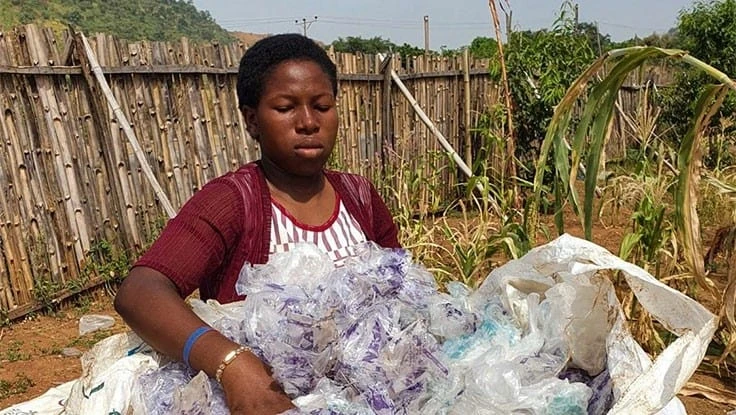
Photo provided by Dow
Dow and Empower, a Norwegian circular platform company that uses blockchain technology to track plastic waste, have announced a new study as part of an ongoing partnership that will examine the feasibility of advancing fully circular value chains in Nigeria.
The study, which will be partly funded by the Norwegian Agency for Development Cooperation (NORAD), will focus on the implementation of a scalable digital waste collection and recycling business model in Lagos, Nigeria. The findings will inform the long-term ambition of the partnership, which is to digitize local collection points, recyclers and waste streams to ensure transparency and reliability into the process of tracking recyclable postuse plastics and converting them into new sustainable packaging.
The Empower digital platform, which uses blockchain technology to ensure the seamless tracking and monetization of plastics waste, provides cost-efficient collection of plastic recyclables, sorting at the source and local job creation for waste pickers in the community and in waste management facilities. The study will identify opportunities to further incentivize the expansion of decentralized sustainable waste management systems where communities manage collection, segregation and processing locally in Nigeria and Africa at large.
Dow and Empower have been working together in Nigeria since 2020 to map and crowdsource the collection and sorting of plastic water sachets, which is a significant environmental problem across West Africa. The findings of the new study will assist in scaling up Project ReflexNG, a water sachet recycling program Dow launched in Nigeria last year in partnership with Omnik, incentive-based collection partners and the Lagos Business School Sustainability Centre.
The project aims to recycle more than 300 million sachets, which would otherwise end up in the environment or landfill. To date, the program has provided an additional source of income for more than 8,000 subscribers to its phone app, which enables the coordination of collection and sorting of end-of-life plastics around the city, and has recovered almost 600 metric tons of plastic in total.
Adwoa Coleman, Africa sustainability and advocacy manager at Dow, says: "Achieving full circularity for plastics, that is, where the practical benefits are matched by its environmental performance, takes each part of the value chain working as a collective and research, such as this new study, which helps us to further assess the feasibility and traceability of plastics waste is invaluable in helping us to advance our efforts.
“That’s why we are excited to partner with digital innovators like Empower to explore new, efficient ways to equip our value chain, partners and customers, so we can advance a circular economy for plastics in Nigeria and the wider continent of Africa.”
“Our ultimate aim is to create a disruptive and circular global plastic waste ecosystem that enables a cost-efficient and reliable sourcing of recycled plastics, with fully traceable materials, to create reliable streams of higher value plastic for the private sector while creating jobs for people that need it the most,” explains Wilhelm Myrer, CEO and founder of Empower.
This project is aligned to Dow’s global Stop The Waste sustainability target, which will enable the collection, reuse or recycling of one million metric tons of plastic globally by 2030.
Latest from Recycling Today
- ReMA opposes European efforts seeking export restrictions for recyclables
- Fresh Perspective: Raj Bagaria
- Saica announces plans for second US site
- Update: Novelis produces first aluminum coil made fully from recycled end-of-life automotive scrap
- Aimplas doubles online course offerings
- Radius to be acquired by Toyota subsidiary
- Algoma EAF to start in April
- Erema sees strong demand for high-volume PET systems





